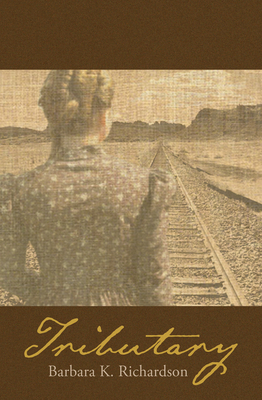At age 36, fresh out of graduate school with a bunch of dead
poems and a despondent heart, I had a visitation. Clair and Ada, my two main characters,
came riding out of the Void and descended together in a dream. They chatted and
revealed themselves and their lives in early Utah, and took up nightly
habitation.
These women had a mission. They wanted to be on the page.
They knew a greenhorn novelist has a lot to unlearn. Namely, the literary
control I’d spent my MFA years perfecting would make writing about my Mormon
ancestors nearly as much fun as pushing wet concrete up a slide.
Perfectionism, polishing, cleverness, language for
language’s sake, intelligence and the desire to be profound—all these went
overboard in the first twelve years of writing my novel Tributary, which just hit bookstore shelves this September. I
actually remember the pleasure of not remembering grammatical rules. Of not
caring whether I came across as literary. Of cutting pretty writing to get to
the goods. Of following a character’s heart which blazed out of the Void with
its own sure track into little black marks that indicated its presence on a
page where others could find it.
All I cared about, all I wanted, was to serve my characters
honestly.
I inherited the stories in Tributary—the history of all my Mormon ancestors—when I joined the Mormon
church at age ten. Utah Mormons are a devoted and communal bunch, and I tried
mightily to fit in that Utah fold. Being odd and hard-headed and me, I left the
church at age eighteen determined to find my own spiritual path.
I knew the path would involve writing. I didn’t know it
would open me to revelation, which is ecstatic and real. For weeks I lay awake in
bed till dawn taking notes from Clair and Ada with a flashlight and a pounding
heart. That sort of beauty—Something,
from Nothing!—demands our full attention.
Still, twenty years of hard work followed those inspired early
weeks, and that’s the rub with revelation. I used all the writerly tricks I
knew to survive, throwing them out like broken tools along the way. Trying to
control the book’s fate—my number one most tenacious writerly bad habit—finally
broke this past summer. I’d thought I was actually doing something. I believed
I was carrying this historical burden and valuing insights into characters
forgotten by history and historians. Control?
What caused my parents to retire from military service and land
in Utah, when I was ten? Why did the high school Seminary field trip I took to
This Is The Place Monument ravish me with sorrow, looking out over the valley
where Zion was built? How, when my health was failing due to too many years writing
a novel no one would ever read on Mormons in the Salt Lake Valley, did I find a
Shoshone healer who erased two decades of anguish and took me in her maroon
Buick to the tiny graveyard where the Shoshones—the very ones my ancestors
displaced—dwell in the gorgeous middle of northern Utah’s nowhere? And when did
interest in Mormonism reach a fever-pitch in the nation’s consciousness? That question I can answer: right when
my beloved, ignored, passionate, epic, impossible-to-sell novel sold.
Barbara's Bio:
I love trees, open spaces, natural ethics, and a handful of books.
My
new novel Tributary took twenty years to complete. Inspired by
stories from my Mormon ancestors, Tributary follows the lives of a
ragtag group of nineteenth-century mavericks who settle in the northern
Utah desert. McMurtry meets the Mormons, you might say.
Guest House, my first novel, brought together kids I have taught, cities I have loved, women I've admired and the ongoing motivation to see, honor and make good homes for neglected children. This theme motivates me deeply. Guest House was an Eric Hoffer fiction finalist.
I earned my MFA in Creative Writing at Eastern Washington University. My work has appeared in "Northwest Review," "Cimarron Review" and "Dialogue." There are writers whose sensibilities elevate the whole human enterprise. I aim to be one of them.
Learn more at: http://www.barbarakrichardson.com
Guest House, my first novel, brought together kids I have taught, cities I have loved, women I've admired and the ongoing motivation to see, honor and make good homes for neglected children. This theme motivates me deeply. Guest House was an Eric Hoffer fiction finalist.
I earned my MFA in Creative Writing at Eastern Washington University. My work has appeared in "Northwest Review," "Cimarron Review" and "Dialogue." There are writers whose sensibilities elevate the whole human enterprise. I aim to be one of them.
Learn more at: http://www.barbarakrichardson.com


4 comments:
Lovely. I felt the same way with both of my novels. My characters said and did things that shocked me. Every one of them insisted on telling the story in a way I had not "planned" through several drafts.
Those women--Ada and Clair--demanding to be heard, and the beautiful synchronicity of the universe in support--that's what gives "Tributary" its strength and beauty, which it has in bunches!
Clair reminded me so much of myself, the way she seeks beauty and connection with land, and doesn't need humans nearly as much. And yet, she has a human family she loves. But she's more-than-human, in a connected-to-the-natural-world way.
To call something "marvel-ous" is my highest praise, and Tributary was indeed marvel-ous.
This post really gets to the heart of the mystery of the writing process in a wholly original way. And it's written as brilliantly as TRIBUTARY itself! Thanks, I loved it.
Liked this so much, I had to share it on Facebook. Here's what I said: Almost every line of Barbara Richardson's essay on how her novel Tributary came into being bears quoting. Here is one chosen almost at random: "Trying to control the book’s fate—my number one most tenacious writerly bad habit—finally broke this past summer."
Post a Comment